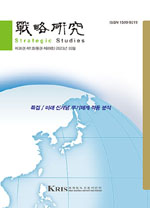Globalization is a term that well represents the characteristics of the current international relations. Several aspects are associated with this term, but nothing is well matched with one aspect involving the concept of interdependence. Interdependence has been deeper especially in economic and ecological dimensions. Economic interdependence is somehow controllable, and several organizations or regimes have been created to accomodate national disputes. Ecological interdependence, however, has been producing multiple national or international problems, without any reasonable and feasible solutions. One cosiderable attempt was made in 1992, introducing a new concept of sustainable development in the world-wide conference called 'Rio Conference'. The concept is nothing more than a principle without any constraining power. Any problems derived from ecological interdependence should be managed in national level. Ecological problems include abnomal conditions of population, resource scarcities, and environmental disorders. These problems would stay in ecological dimensions, if intensity is under a certain marginal level. Policies involving population constraints, energy savings, environmental protections are all domestic solutions. If aD nations agree with this line of options, then no serious conflicts would break out in international relations. This expectation is somewhat different from what happens in the world. In history, many developed countries showed a strong propensity for outside expansion, searching for natural resources. National conflicts in this process were prevalent, and not a few countries that had actual power had to face severe problems very similar to Malthusia casulties. This is whyecological problems should be treated as national security issues. This paper generates a set of research questions that are associated with the relationship between ecological problems and security affairs. The case to deal with is focused upon South Korea. The scope, however, reaches to East Asia, because the regional boundary is supposed to involve an outer ecological sphere for South Korea. Specific analysis is laid upon issue areas including population, resource, and environment. Ecological dynamics of East Asia is first examined, and findings are closely linked to South Korea's ecological conditions in security prespective. There are thirteen countries in East Asia. In population dynamics, the population growth rate proves the fact that East Asian countries are in general little away from the profile of developed countries, since they maintaine a high growth rate. Only Japan showes a desirable profile. Starvation is found in Combodia and North Korea. The propensity for migration is growing in the region for economic purposes. Refugees are expected to increase, because most countries are likely to face with political instability, In terms of strategic resources, East Asia has been known to maintain affluent resources. Southeast Asia and Northeast Asia are distinguished in the figures of natural resources. Southeast Asia is in a favorable condition, but Northeast Asia reveals a severe scarcity. The two subregions are interrelated in resource profiles, but the resource problems of Northeast Asian countries are not in complete solution. They show a severe dependence on foreign resources. Environmental degradation is growing, but no serious conflicts among countries have been shown yet. Environmental problems are not impending agendas today, and they wil be so in the future. East Asia can be treated as an outer sphere for South Korea's ecologicalconditions. The sphere is expected to provide South Korea with certain amounts of energy, food, and non-fuel minerals. At the same time, the sphere is likely to carry threats to South Korea, mainly comming from refugees, acid rains, illegal migration, and so forth. For survival, South Korea can not confine its foreign activities to East Asia.
Ⅰ. 서론
Ⅱ. 생태학적 쟁점과 국가안보
Ⅲ. 동아시아의 생태학적 여건과 실상
Ⅳ. 한국의 생태학적 실상과 안보쟁점
Ⅴ. 결론
참고문헌
Summary
(0)
(0)
